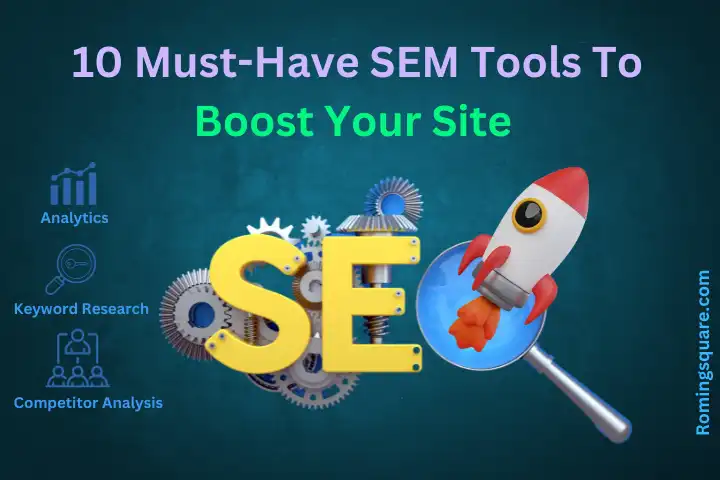
In today’s digital landscape, harnessing the power of search engine marketing (SEM) is critical for any website’s success. The right SEM tools can take your site from barely scraping by to soaring in search visibility and traffic.
This guide will explore the top 10 SEM tools to skyrocket your site’s performance this year. We’ll cover what SEM tools are, why you need them, and how to choose the best options for your goals and budget.
Let’s start by understanding exactly what SEM entails.
What is SEM and Why It Matters
SEM stands for Search Engine Marketing. It refers to strategies and techniques for improving a website’s rankings and visibility in search engine results pages (SERPs).
The main components of SEM include:
- SEO (Search Engine Optimization) – Optimizing pages and content to rank better for relevant keyword searches.
- PPC (Pay-Per-Click) – Running paid ads on search engines and other sites to drive targeted traffic.
- Keyword Research – Identifying high-value keyword terms and phrases to target.
- Competitor Analysis – Researching what rivals are doing to benchmark and get insights.
- Analytics – Tracking KPIs like impressions, clicks, conversions to optimize efforts.
SEM helps you connect with motivated site visitors who are actively searching for your products, services or information. Done right, it can deliver exponential growth in qualified organic and paid traffic.
Say you run an online shoe store. With SEM best practices, you could:
- Optimize product pages for keywords like “brown leather oxford shoes.”
- Purchase PPC ads targeting searches for “men’s dress shoes.”
- Research competitors to find new keywords and campaigns to model.
- Analyze data on clicks and sales to double down on what converts.
As you can see, SEM brings together multiple disciplines under one umbrella to maximize search visibility and performance.
Why Invest in SEM Tools?
SEM tools provide the strategies, insights and automation to master search marketing in today’s competitive landscape.
Think of your website as a storefront on the digital main street. Without SEM, it’s like being located on a barren side alley that no one passes through.
With the right tools, you can transform that site into a high-traffic hot spot at the heart of the action.
Benefits of SEM tools include:
- Increase qualified organic and paid traffic – Meet rising demand for your brand.
- Outrank competitors – Learn and adapt faster to edge out rivals.
- Save time – Automate tedious SEO and PPC tasks.
- Spot opportunities – Identify untapped keywords and optimization options.
- Improve conversions – Double down on high-ROI campaigns.
- Stay agile – Adapt to changing algorithms and trends.
Today’s most powerful SEM tools make executing complex strategies simple. Read on as we reveal the top 10 options to launch your success.
The 10 Best SEM Tools To Skyrocket Site Traffic
Based on expert recommendations and verified user reviews, here are the top 10 tools no SEM strategy should be without:
1. SEMrush
With an extensive feature set spanning SEO, PPC, content marketing and more, SEMrush is a leading all-in-one SEM tool.
Key features:
- 65+ tools for comprehensive SEM and SEO
- Keyword research for 700M+ keywords
- Backlink analysis and audits
- Competitor tracking and analysis
- PPC keyword research
- Ad creation and campaign management
- Marketing analytics across channels
Pricing for SEMrush
- Pro: $129.95/month
- Guru: $249.95/month
- Business: $499.95/month
SEMrush makes executing technically complex strategies simple. It’s a robust solution for enterprises, agencies and power users.
2. Google Keyword Planner
For unlocked keyword data directly from the source, Google’s free Keyword Planner is invaluable.
Key features:
- Keyword research backed by Google’s data
- Search volume and forecasting
- Competition metrics for keywords
- Integrates with Google Ads for PPC planning
- Filters to customize keyword searches
- Ability to save keyword lists
Pricing for Google Keyword Planner Is Free
If you want keywords directly informed by Google’s unmatched search data, the Keyword Planner is the top free tool.
3. SpyFu
SpyFu enables deeply researching the SEM campaigns and strategies of your competitors.
Key features:
- Competitor keyword research
- Analysis of competitors’ PPC and shopping ads
- Clicks, conversions and spend tracking
- SEO and PPC campaign insights
- Keyword gap analysis
- Easy export of reports
Pricing for SpyFu:
- Basic: $33/month
- Professional: $58/month
- Team: $149/month
For revealing competitor strategies and benchmarking your performance, SpyFu delivers powerful competitive intelligence.
4. Optmyzr
Optmyzr brings automation and workflow management to day-to-day SEM tasks.
Key features:
- One-click tools to optimize Google/Bing ads
- Automated bid management
- Bulk ad creation and editing
- Budget pacing and allocation
- Alerts and monitoring
- Custom reporting
Pricing for Optmyzr:
- Core: $208/month
- Advanced: $399/month
- Enterprise: Negotiable
This tool saves hours of tedious optimization work so you can focus on high-level strategy.
5. Google Ads Editor
Google’s free Ads Editor makes mass changes and edits to Google Ads streamlined.
Key features:
- Bulk changes across campaigns, ads, keywords
- Ad creation and editing workflows
- Campaign structure management
- Bid adjustments in bulk
- Support for Google Merchant Center
- CSV imports for new ads
Pricing for Google Ads Editor Is Free
The editor’s batch editing capabilities are invaluable for rolling out big changes across multiple campaigns.
6. Supermetrics
For bringing all your SEM data together for unified reporting, Supermetrics is the leading tool.
Key features:
- Connects 100+ data sources via API or SQL
- Real-time dashboard of campaign performance
- Automated report generation
- Scheduled data syncs and exports
- Funnel visualization
- Support for Google Sheets and Data Studios
Pricing for Supermetrics:
- Essential: $69/month
- Core: $239/month
- Super: $579/month
- Enterprise: Negotiable
Supermetrics saves hours of manual reporting time. With all data in one place, generating insights is quick and easy.
7. HubSpot Ads
HubSpot’s intuitive ad management platform takes the pain out of PPC.
Key features:
- Easy campaign setup with templated options
- Drag-and-drop ad creation
- Keyword research and management
- Customizable dashboards
- Landing page and form builders
- Integrates with HubSpot CRM and email
Pricing for HubSpot Ads:
- Starter: Free
- Professional: $50/month
- Enterprise: $800/month
For those new to PPC, HubSpot Ads eases ad creation, launches and reporting with its simple workflows.
8. Moat
Moat provides deep analytics into the viewability, attention and performance of digital ads.
Key features:
- Ad viewability metrics
- Video and display attention analytics
- Real-time ad monitoring
- Fraud and invalid traffic detection
- Brand safety scoring
- Research database of 7B+ ads
Moat gives unmatched insights into exactly how your target audiences see and engage with ads. Its attention metrics reveal content that resonates.
9. Unbounce
Unbounce makes creating, testing and optimizing high-converting landing pages easy.
Key features:
- 100+ optimized templates
- Drag-and-drop landing page builder
- Native forms and lead capture
- Dynamic text replacement
- A/B testing built-in
- Analytics integration
Pricing for Unbounce:
- Launch: $74/month
- Optimize: $109/month
- Accelerate: $180/month
- Concierge: $469/month
With Unbounce, you can quickly launch and iterate landing pages that turn your SEM traffic into conversions.
10. Lunio
For identifying and eliminating invalid clicks wasting your PPC budget, Lunio protects your bottom line.
Key features:
- Flags fraudulent, bot and invalid traffic
- Chargeback requests for wasted spend
- Audit log of suspicious clicks
- Settings to automatically pause bad accounts
- Complete visibility into click patterns
Pricing for Lunio:
- Essentials: $149/month
- Professional: $349/month
- Business: $849/month
- Enterprise: Negotiable
Lunio ensures the clicks you’re paying for are from real, intentional users who want your offering.
Tips for Choosing the Best SEM Tool
With many options available, focus on these factors when selecting an SEM tool:
🎯 Your Goals – Identify the biggest pain points and objectives you need to address. Let those guide tool selection.
⚙️ Key Features – Compile must-have functionality like keyword research, competitor analysis, etc.
💰 Your Budget – Plan a budget for software based on available resources and potential ROI.
🤹♂️ Ease of Use – The tool should work intuitively without a steep learning curve.
🤝 Integration – It should play nice with other software you use like analytics platforms.
📈 Scalability – Ensure the tool can power your efforts as your initiatives grow.
🔒 Data Security – For PPC accounts and analytics, the tool should offer robust data protections.
💬 Customer Support – Look for responsive and knowledgeable support to maximize value.
🔎 Free Trials – Test options first-hand before fully committing.
By matching tools to your exact needs and budget, you ensure maximum return on investment.
Transform Your SEM Strategy With The Right Tools
A rocks-and-sticks survival strategy may have worked a decade ago. But today’s SEM landscape requires modern tools to gain a competitive edge.
This guide provided a framework of the 10 essential SEM tools that leading brands rely on to elevate performance.
While these tools provide powerful functionality, your strategy determines success. Glean as much knowledge as you can about proven approaches to execute effectively with your new toolbox.
Spend time formulating an agile strategy adapted for today’s ever-evolving search and advertising ecosystems. Learn constantly and lean on tools to unlock efficiency.
With the right approach, amplified by tools like SEMrush, Google Ads Editor, Supermetrics and more, your site’s visibility and conversions will reach new heights this year.
The search marketing arena can seem intimidating. But with smart strategy and the elite tools above, you’ll gain the capabilities once only reserved for enterprises.
Here’s to launching your new SEM arsenal and growth taking off in 2024! Let us know in the comments what SEM tools you find most valuable.
What are the main components of SEM?
The main components of SEM include search engine optimization (SEO), pay-per-click (PPC) advertising, keyword research, competitor analysis, and analytics.
Why should I invest in SEM tools for my website?
SEM tools can increase qualified traffic to your site, help you outrank competitors, automate tedious tasks, reveal new opportunities, and provide data to optimize your efforts.
What should I look for when choosing an SEM tool?
Consider your goals, must-have features, budget, ease of use, scalability, integration with other software, data security, and quality of customer support when selecting an SEM tool.
Which free SEM tool is best for keyword research?
Google’s Keyword Planner provides excellent keyword data informed by Google’s search stats and is the top free tool for keyword research.
What tool is best for researching competitor SEM strategies?
SpyFu enables deeply researching competitors’ keyword targeting, PPC and shopping ads, clicks, conversions, and more, making it a powerful competitive intelligence tool.





